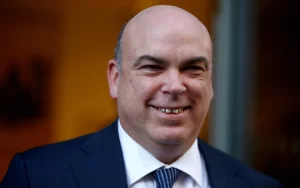
Steward will sue its landlord for interfering with hospital sales, court filings show
The Steward Health Care drama unfolding in Massachusetts gained another wrinkle on Monday, when the now-bankrupt company told a federal court that their efforts to sell their hospital properties have been stymied by their landlords.
According to court filings, Steward claims Medical Properties Trust, the company that owns the land upon which Steward’s buildings sit, has been standing in the way of their efforts to sell their hospital properties — including several in the Bay State — in clear violation of the bankruptcy rules.
“The Debtors have engaged in a robust marketing and sales process to explore all available transactions that would allow them to sell their hospitals to new operators who can continue to serve the Debtors’ patients and communities. As discussed below, however, these efforts have been disrupted by parties who have refused to follow the clear ground rules,” Steward’s attorneys wrote.
According to Steward’s legal representatives, MPT has “attempted to undermine” the sales process by “communicating directly with the Debtors’ bidders without the Debtors’ consent and in a manner that violates the Bidding Procedures” and is “directing bidders, many of which have prior and ongoing relationships with MPT or otherwise seek to enter into revised leases with MPT as their future landlord, to allocate all of the value of their bids to MPT’s real estate.”
MPT also, Steward says in the complaint, is “attempting to pressure” Steward into siphoning “all value” from the hospitals to their landlords, therefore “leaving the estates bare and risking the Debtors’ ability to maintain and sell their operations in a manner that maximizes value and safeguards patient health and safety.”
In assigning value to Steward’s hospital properties or the land under them, the health care company and its landlords have competing interests when it comes to “the proposed terms of a new lease with MPT,” the company’s lawyers say before outlining the steps they’ll take to protect the interests of their clients.
“In response to MPT’s attempts to siphon value from the Debtors’ estates and, ultimately, resources from the Debtors’ creditors, patients, employees, and other key stakeholders, consistent with the Global Bidding Procedures, the Debtors have begun taking certain remedial actions,” Stewards lawyers wrote.
According to court filings, Steward says they have allowed bids that “contemplate a single purchase price for the relevant hospital’s or hospitals’ operations and real estate combined” and that they’ll seek approval for escrow sale proceeds for “any sale transaction for which there is no agreement on allocation of value.”
Steward asks the court as “independent arbiter” to “make a determination with respect to the value of the Debtors’ assets upon which the parties can rely.”
A spokesperson for MPT told the Herald that the company has been “collaborative and accommodating” in Steward’s attempts to keep its hospitals open through bankruptcy proceedings and that they “categorically reject any accusation that MPT has interfered with Steward’s marketing and sales efforts – on the contrary, we have proactively worked with potential bidders to address real estate-related matters.”
“Steward’s lawyers are wrongly blaming MPT for holding up sales when in fact Steward has refused to sell hospitals in order to extract value from MPT. The rent that Steward agreed to pay in the leases with MPT is a small fraction of Steward’s revenues, and in fact is dwarfed by the fees being charged by the professionals in this bankruptcy case. Despite Steward’s recent attempts to rewrite history, their own statements at the outset of the bankruptcy process make clear their financial stress is a product of their own operating failures – not rent obligations,” the spokesperson said.
The news comes as the Bay State is hip-deep in Steward’s ongoing financial crisis.
On Friday, Gov. Maura Healey said the company was close to completing several deals that would keep most of the hospitals open.
But most notably, Healey announced, the state was moving to take St. Elizabeth’s Hospital in Brighton by eminent domain. The state’s offer letter to MPT and Apollo Commercial Real Estate Finance, dated Friday, emerged Monday and revealed Massachusetts was offering $4.5 million.
The state came up with that price based on “the current third-party offer” for the hospital, the letter states.
The Healey administration requested a response to the offer by Tuesday and indicated it was also proceeding with preparations for the eminent domain taking.
Other sale arrangements announced Friday would see Lawrence General Hospital take over Holy Family Hospital campuses in Haverhill and Methuen. Lifespan system, a Rhode Island-based company, would buy Morton Hospital in Taunton and St. Anne’s Hospital in Fall River, and Boston Medical Center offered to buy Good Samaritan Medical Center in Brockton. BMC would also become the eventual operator of St. Elizabeth’s after the taking.
All of these arrangement came after the state told the bankruptcy court it would advance Steward $30 million in MassHealth related payments in order to keep their hospitals afloat through August. Steward, meanwhile announced it would close both Carney Hospital, in Dorchester, and Nashoba Valley Medical Center, in Ayer.
Regarding the closure of Carney and Nashoba, Healey has said that “it’s Steward’s decision to close these hospitals. There’s nothing that the state can do, that I can do, that I have the power to do, to keep that from happening.”
On Saturday, U.S. Reps. Stephen Lynch and Ayanna Pressley urged Healey to step in and save Carney.
“The agreement announced yesterday by the Healey-Driscoll Administration — especially the seizure of St. Elizabeth’s Hospital in Brighton — is the type of pivotal action needed in this moment, and we urge the Commonwealth to move with the same level of urgency to keep Carney Hospital in Dorchester open as well,” they said in a joint statement.
Health care advocates MassCare urged Healey to “finish the job,” and keep Carney and Nashoba open.
“If the State can take one, they can take the other two hospitals. Carney, in Dorchester, services the largest Black and Brown neighborhoods in Boston, and Nashoba Valley services rural areas filled with small towns in central Massachusetts. Health care justice demands we protect our existing health care infrastructure and move boldly forward to improve access to health care for all Massachusetts residents regardless of income or where they live,” the group said in a statement.
St. Elizabeth’s Medical Center, in Brighton. (Matt Stone/Boston Herald, file)


